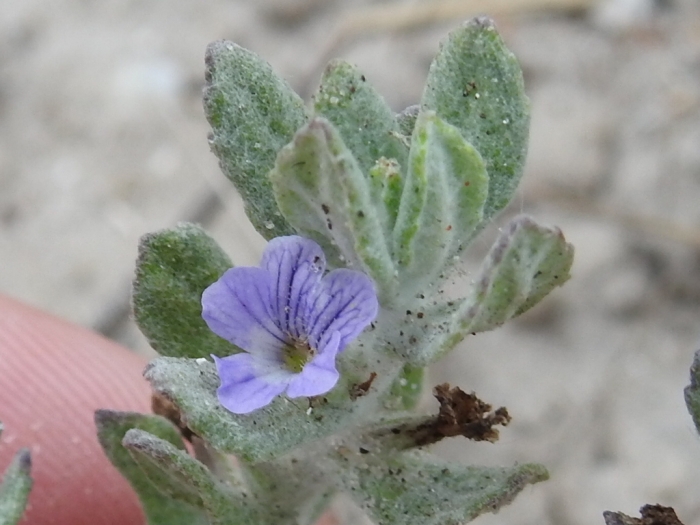Woolly Stemodia
(Stemodia lanata)
Woolly Stemodia (Stemodia lanata)
/
/

Sam Kieschnick
CC BY 4.0
Image By:
Sam Kieschnick
Recorded By:
Copyright:
CC BY 4.0
Copyright Notice:
Photo by: Sam Kieschnick | License Type: CC BY 4.0 | License URL: http://creativecommons.org/licenses/by/4.0/ | Rights Holder: Sam Kieschnick | Publisher: iNaturalist | Date Created: 2017-10-19T03:18:17-07:00 |

























Estimated Native Range
Summary
Stemodia lanata, commonly known as Woolly Stemodia, is a low-growing, perennial groundcover native to a variety of habitats including coastal prairies, sandy plains, and rocky outcrops in the southern United States, particularly Texas and Florida, as well as extending into Mexico and Central America. It is adapted to hot, dry conditions and often found in areas with well-drained soils. Woolly Stemodia typically grows up to 6 inches tall and can spread widely, forming a dense mat of silvery-green foliage due to its woolly texture. The plant produces small, tubular, blue to violet flowers that are most abundant in the spring and fall, but can appear nearly year-round in its native range, adding a subtle splash of color to the landscape.
Woolly Stemodia is valued for its drought tolerance once established, making it an excellent choice for xeriscaping and low-water gardens. It thrives in sandy, well-drained soils and can tolerate a range of light conditions from full sun to part shade. Its ability to spread and cover ground quickly makes it useful for erosion control on slopes and in coastal areas. While it is generally low-maintenance, it can benefit from occasional watering during prolonged dry spells. Gardeners may use it as a ground cover, in rock gardens, or as part of a native plant garden to support local wildlife.CC BY-SA 4.0
Woolly Stemodia is valued for its drought tolerance once established, making it an excellent choice for xeriscaping and low-water gardens. It thrives in sandy, well-drained soils and can tolerate a range of light conditions from full sun to part shade. Its ability to spread and cover ground quickly makes it useful for erosion control on slopes and in coastal areas. While it is generally low-maintenance, it can benefit from occasional watering during prolonged dry spells. Gardeners may use it as a ground cover, in rock gardens, or as part of a native plant garden to support local wildlife.CC BY-SA 4.0
Plant Description
- Plant Type: Herb, Subshrub
- Height: 0.5-1.5 feet
- Width: 1.5-2 feet
- Growth Rate: Moderate
- Flower Color: Purple, White
- Flowering Season: Spring, Summer, Fall
- Leaf Retention: Deciduous
Growth Requirements
- Sun: Full Sun
- Water: Low
- Drainage: Fast, Medium
Common Uses
Drought Tolerant, Low Maintenance, Rock Garden
Natural Habitat
Coastal prairies, sandy plains, and rocky outcrops
Other Names
Common Names: Woolly Stemodia, Velvet Stemodia, Stemodia Lanata, Gray Stemodia
Scientific Names: , Stemodia lanata, Erinus tomentosus, Herpestis tomentosa, Stemodia tomentosa, Stemodiacra tomentosa,
GBIF Accepted Name: